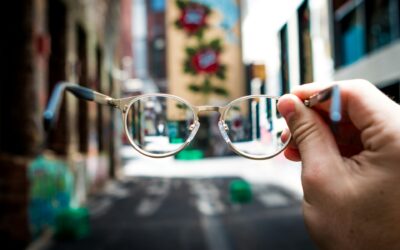New glasses are a big investment. While getting a new pair of glasses is exciting, many often wonder what they can do to prolong the lifespan of their glasses to get as many years of wear out of them as possible.
How to Properly Clean Your Glasses
When it comes to cleaning glasses, there are many various recommendations.
The very best way to clean your glasses is with dish soap and water.
Start the process by washing and drying your hands. Next, simply squirt a drop of liquid dish soap onto your lenses. Using your fingers, rub the soap around the lenses and then rinse them in warm water.
To dry lenses, use a clean, dry lens cleaning cloth.
Alternatively, one can use a lens cleaning spray available for purchase through most eye doctors. Then dry with a clean lens cloth.
You should avoid using nail polish remover, rubbing alcohol, Windex, or other “glass cleaner” as many glasses lenses have special coatings on them (anti-reflective, anti-scratch, blue light blocking, etc.). Harsh chemicals may remove these coatings and void any lens warranty your glasses might have.
Additionally, drying your new glasses is as equally important as washing them.
Glasses lenses are typically made from some form of plastic (polycarbonate, Trivex, and hi-index materials are all forms of plastic) as it provides the best optics in addition to being lightweight. Plastic is easily scratched.
This being said, any time you rub fragments into the lenses—other plastic, metals, rocks, etc.—it can scratch the lenses. Of course no one intentionally rubs debris into their glasses lenses, however many people unintentionally rub debris into their glasses through wiping lenses on T-shirts, wash rags, paper towels, tissues, etc.
The above materials trap in debris, hence why they are often recommended for household cleaning. While debris trapped in these materials may be microscopic, it can still damage lenses when rubbed against them, creating small scratches which in turn affect the optics of the lenses.
For this reason, it is recommended to dry glasses lenses only with a designated lens cleaning cloth, which can typically be purchased from your local optometrist or through stores such as Amazon, Walmart, and Target.
Lens cleaning cloths can be washed in the washing machine with your other clothes. It is recommended that you wash your cleaning cloth any time there is visual dirt or debris, or at least once a week for the best outcome.
How to Keep Your Glasses Safe
Storing your glasses is just as important as cleaning them. As mentioned above, glasses can be scratched rather easily.
The best way to avoid scratching your lenses is through keeping them in a case when not on your face.
If you cannot keep them in a case, be sure when you take your glasses off that you fold them up and place them on a flat surface lenses up (or temples down). You do not want to place glasses lenses-down on a surface, as any time they are pushed or knocked around they slide against the surface, increasing the risk for scratching the lenses.
Secondarily, be sure to keep your glasses stored out of reached from little ones or pets, as they often do not understand the fragility of glasses and chew or break glasses frames. Additionally, teeth marks (from pets, children, or yourself) void any warranty your glasses frame may have.
Lastly, try to avoid falling asleep in your glasses or performing strenuous activities (kick boxing, martial arts, etc.) in your glasses as hard blows can bend or warp your glasses frames, resulting in a frame that no longer fits your face.
If you do happen to scratch your glasses lenses or break your frame, be sure to bring your glasses into wherever you purchased the glasses from. Some frames and lenses have a one-year warranty on them. If the break is a manufacturer’s error, you may be able to get a new frame or set of lenses under warranty.
Other Commonly Asked Questions About Glasses
Q: One of the nose pads on my glasses fell off, can you fix this?
Yes, given the nose pad holder is not damaged. Bring your glasses into where you purchased them and an optician will be able to help you assess this situation and replace the nose pad given the frame is still in good shape.
Q: My lenses are scratched, can you buff the scratches out?
Unfortunately not. Glasses prescriptions are ground into the lenses. Any “buffing” of the lenses would alter the optics of the lenses, therefore altering the prescription.
Q: One of the temples fell off my glasses, can you fix this?
Sometimes, depending on the break. If the hinge screw fell out, one can typically be replaced without issue. However if the hinge is damaged, repairs may not be able to be completed.
Q: I bought my glasses years ago. The office I bought them from went out of business or is hours away, can someone else fix them?
Sometimes. Many offices will do glasses repair without you having to have purchased them from that office. You may just need to fill out paperwork stating you are allowing the office to work on your glasses and that you understand the repairing office cannot be held accountable for any breakage that occurs during the repair process.
Q: I have a pair of glasses I see really well out of, but the frame broke. Can you just take the lenses out of the broken frame and put them into another, new frame?
No. Glasses lenses are edged in a lab specifically so that they fit in a frame in a manner that allows you to look through the optical center of the lens. Many calculations and measurements are utilized to make this happen. Changing a frame alters all of this, so your lenses from the original frame likely will not fit into a new frame properly.





